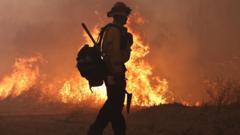In a strong opening statement at the COP29 conference, John Podesta, the US special climate envoy, declared that the United States would persist in addressing climate change and reducing greenhouse gas emissions, even in light of Donald Trump’s election as President. Podesta, an appointee from the Biden administration, characterized Trump as a "climate denier," asserting that he would move to eliminate crucial environmental protections and withdraw the U.S. from the Paris Agreement.
Despite prevailing worries over Trump's election implications, country representatives made notable strides in international climate negotiations, reaching a preliminary agreement aimed at allowing wealthier nations to compensate for their emissions by funding clean energy initiatives and reforestation projects in developing countries.
The Paris Agreement, established in 2015, aimed to limit global temperature increases to below 1.5C. As nearly 100 world leaders prepared to address the conference, expectations for significant achievements were tempered by Trump’s election outcome, which many experts believe hampers U.S. negotiators’ effectiveness due to their "lame duck" status. Nevertheless, Podesta remained optimistic, emphasizing that the climate struggle transcends any single election or political timeframe.
He pointed out that despite potential setbacks, the policies and initiatives started under the Biden administration, alongside local government engagement, would likely sustain a downward trend in U.S. emissions. "This fight is bigger than one election, one political cycle, and one country," he noted, stressing the global nature of climate challenges in 2024.
Further concerning the ongoing climate crisis, the conference witnessed the successful finalization of the Paris climate agreement's contentious global carbon market mechanism on its opening night. This allows wealthier nations to fulfill their climate obligations by investing in emission-reduction projects in developing countries, a development particularly appealing to European countries keen on cost-effective emissions reductions. However, concerns regarding the integrity of these projects, particularly issues of fraud and the permanence of carbon removals, still linger.
The urgency of the situation was underscored by a recent UN report, which revealed that 2024 is projected to become the hottest year on record, coupled with alarming findings about ocean heating and accelerating glacier melt. COP29 president Mukhtar Babyaev warned of the palpable climate impacts being felt worldwide, indicating that these challenges are not distant woes but pressing realities.
As delegates confronted the enormous task of securing additional climate finance for developing nations amidst current energy and economic crises, the sense of urgency grew. Developed countries expressed a willingness to escalate their financial commitments, provided emerging economies like China also contribute.
UN climate chief Simon Stiell highlighted that advancing climate finance is a mutual interest for all nations, stating, "Let’s dispense with any idea that climate finance is charity." He emphasized the collaborative importance of tackling emissions, warning that two-thirds of the globe cannot afford to make significant cuts without external support.
Adding to the rising tensions at the conference was the exorbitant cost of refreshments at the venue, causing dissatisfaction among delegates who found meal prices unfairly high. For many from lower-income countries, the financial burden of attending such significant conferences can be overwhelming when travel and accommodation are factored in.
Despite prevailing worries over Trump's election implications, country representatives made notable strides in international climate negotiations, reaching a preliminary agreement aimed at allowing wealthier nations to compensate for their emissions by funding clean energy initiatives and reforestation projects in developing countries.
The Paris Agreement, established in 2015, aimed to limit global temperature increases to below 1.5C. As nearly 100 world leaders prepared to address the conference, expectations for significant achievements were tempered by Trump’s election outcome, which many experts believe hampers U.S. negotiators’ effectiveness due to their "lame duck" status. Nevertheless, Podesta remained optimistic, emphasizing that the climate struggle transcends any single election or political timeframe.
He pointed out that despite potential setbacks, the policies and initiatives started under the Biden administration, alongside local government engagement, would likely sustain a downward trend in U.S. emissions. "This fight is bigger than one election, one political cycle, and one country," he noted, stressing the global nature of climate challenges in 2024.
Further concerning the ongoing climate crisis, the conference witnessed the successful finalization of the Paris climate agreement's contentious global carbon market mechanism on its opening night. This allows wealthier nations to fulfill their climate obligations by investing in emission-reduction projects in developing countries, a development particularly appealing to European countries keen on cost-effective emissions reductions. However, concerns regarding the integrity of these projects, particularly issues of fraud and the permanence of carbon removals, still linger.
The urgency of the situation was underscored by a recent UN report, which revealed that 2024 is projected to become the hottest year on record, coupled with alarming findings about ocean heating and accelerating glacier melt. COP29 president Mukhtar Babyaev warned of the palpable climate impacts being felt worldwide, indicating that these challenges are not distant woes but pressing realities.
As delegates confronted the enormous task of securing additional climate finance for developing nations amidst current energy and economic crises, the sense of urgency grew. Developed countries expressed a willingness to escalate their financial commitments, provided emerging economies like China also contribute.
UN climate chief Simon Stiell highlighted that advancing climate finance is a mutual interest for all nations, stating, "Let’s dispense with any idea that climate finance is charity." He emphasized the collaborative importance of tackling emissions, warning that two-thirds of the globe cannot afford to make significant cuts without external support.
Adding to the rising tensions at the conference was the exorbitant cost of refreshments at the venue, causing dissatisfaction among delegates who found meal prices unfairly high. For many from lower-income countries, the financial burden of attending such significant conferences can be overwhelming when travel and accommodation are factored in.

















